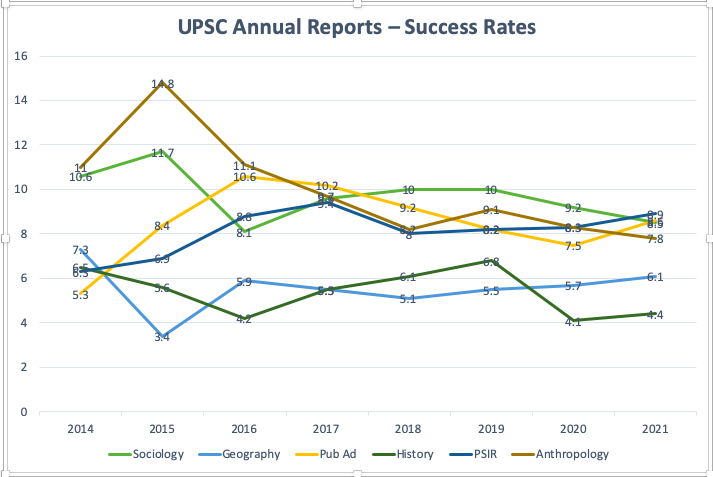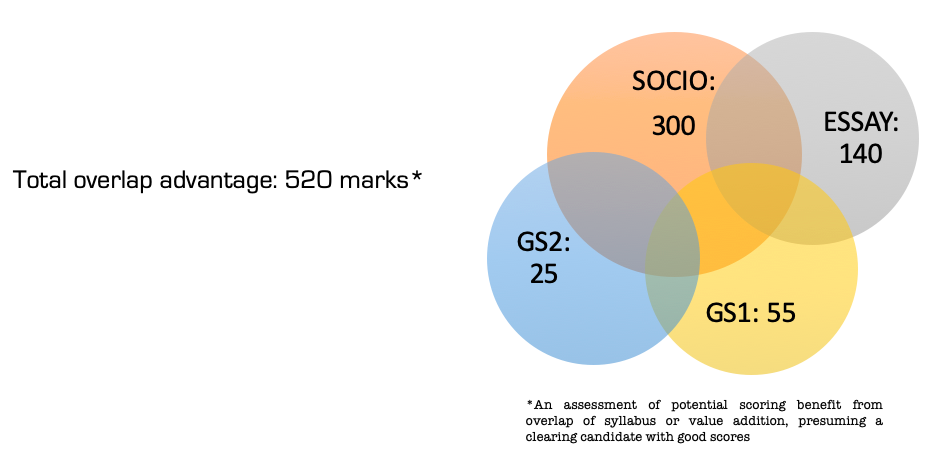Does Sociology Optional have high success rates?

Sociology has demonstrated consistent strength, maintaining higher average scores across the years compared to most other subjects. It has also been dependably high scoring, being nearly the highest performer in each of the last 4-5 years.
Geography showed a positive recovery in success rates from 2014 albeit at a much lower total rate than sociology , while Public Administration and PSIR reflected strong, steady performance albeit slightly at lower rates than sociology across most years. On the other hand, History and Anthropology exhibited notable challenges, particularly in sustaining performance over the years.
Let’s then talk about the pros and cons of Sociology as an optional
Pro’s:
- There is absolutely no need of having any specific academic background for choosing this optional, since the subject matter deals with topics that deal with everyday life such as class, caste, religion, family etc., It is thereby very relatable and makes for a simple understanding.
- It is the among the most relevant subjects for becoming an IAS/IPS officer- to understand bureaucracy, politics, caste, class, religion, population dynamics etc. which is a pre-requisite to becoming an officer capable of performing one’s duty effectively.
- We as humans really struggle with memorizing facts. This is a universal condition. Sociology thankfully is a subject based largely on concepts, very simple and relatable ones. It thus reduces a lot of effort and energy required otherwise in rote learning.
- It has been consistently among the highest-scoring subjects, with many toppers every year.
- It has a large overlap advantage, translating into a multiplier effect for your marks. This is so, as it has a huge overlap with GS syllabus and essay. Thereby, effort done studying sociology optional gets you additional advantage in Indian Society in GS paper1, Social Justice in GS paper 2, and the Essay paper (which is the second highest scoring after the optional).

Cons:
- No matter the syllabus being shorter relatively, it still needs effort and consistency to prepare. Revision, answer writing practice and iterative improvement. There is no additional disadvantage of choosing Sociology as an optional subject apart from the effort and hard work that the preparation for a UPSC optional will take.
How to start with Sociology optional preparation
There’s a green colored book called ‘Sociology’ by Paul B Horton and Chester L Hunt. It’s a great book to acquaint yourself with concepts and to get a good anchoring to the subject. It’s a very relevant book. The trick is to read it like a novel, without putting in the effort to memorize. The content itself is so interesting and presented with so many examples that one remembers anyway. While it is not necessary to read the book before joining coaching (if that’s the plan), but reading it may get you to fall in a love with the subject.
After analyzing the past year’s questions, what has been the trend in marks and questions in Sociology Optional?
- The difficulty level of the Sociology optional papers has remained moderate. As such the highest marks in recent years have been in the range of 310-324 marks, which are really good scores.
- The questions are also uniformly asked from different parts of the syllabus making thorough preparation the most standard trustable strategy.
- There thematic repetition is very high. Many questions in fact are replicas of previous year questions. Thereby, solving PYQs remains a very effective strategy for the coming year.
- Topics such as social thinkers, social stratification, and political sociology frequently appear in both Paper I and Paper II and have a higher question-hit ratio in the paper.
- The unit of Research methods have had an increase weightage in the past 2 years. The number of questions asked from Unit 2,3 in paper 1 have increased.
- The examiner combines standard theory with application in many questions. So, current affairs integration and developing one’s own perspectives remains important.
What are some tips for writing a ‘good’ answer in Sociology?
Writing a ‘good’ answer in the Sociology Optional for the UPSC exam involves several key elements. Here are some tips:
- Understand the Question Thoroughly
Read Carefully: Ensure you understand what the question is asking. Look for keywords and directives like “discuss,” “analyze,” “critically evaluate etc.
Scope: Identify the scope of the question. Determine whether it requires a broad overview or a detailed analysis of a specific concept.
- Structure Your Answer
Introduction: Start with a clear and concise introduction. Define key terms and set the context for your answer.
Body: Divide the body into logical sections. Use headings and subheadings if necessary.
- Theoretical Perspective: Explain relevant sociological theories and concepts.
- Examples and Case Studies: Provide examples, case studies, and data to support your points.
- Critical Analysis: Evaluate the theories and perspectives. Highlight strengths and weaknesses.
Conclusion: Summarize the key points and provide a concluding remark that reflects on the broader implications of the topic.
- Incorporate Sociological Thinkers
Mention Key Sociologists: Refer to major sociologists relevant to the topic. For example, while discussing social stratification, mention Karl Marx, Max Weber, and Pierre Bourdieu.
Quotes and Theories: Use quotes and theories from sociologists to add depth to your answer.
- Use Current Affairs and Contemporary Examples
Relevance: Link theories to contemporary events and issues. For instance, when discussing globalization, mention recent economic policies or international trends.
Data and Reports: Include relevant data from credible sources such as census reports, UN reports, and other reputable studies.
- Critical Evaluation
Balance: Present multiple viewpoints. Discuss both sides of an argument where applicable.
Critique: Critically evaluate theories and perspectives. Point out limitations and strengths.
- Clarity and Precision
Language: Use clear and precise language. Avoid jargon unless it is necessary and explain it when used.
Conciseness: Be concise and to the point. Avoid unnecessary details that do not add value to your answer. Everything that is mentioned, does not need explanation.
- Presentation
Neatness: Write neatly and legibly. Use paragraphs to break up text.
Diagrams and Charts: Where relevant, use diagrams, flowcharts, and tables to illustrate points. This can make your answer more engaging and easier to understand.
Sample Structure for a Sociology Answer
Question: Discuss the impact of globalization on the caste system in India.
Introduction:
- Define globalization and its dimensions.
- Briefly mention the traditional structure of the caste system in India.
Body:
- Globalization and Economic Changes:
- Discuss how economic liberalization has affected job opportunities across castes.
- Mention examples of Dalits and other lower castes entering new professions due to increased opportunities.
- Cultural Impact:
- Explain how global media and culture have influenced caste dynamics.
- Cite instances where global cultural practices have led to changes in traditional caste practices.
- Social Mobility:
- Analyze the role of education and urbanization in increasing social mobility among lower castes.
- Provide data on the educational attainment and urban migration of lower castes.
- Critical Evaluation:
- Discuss the persistence of caste discrimination despite economic and cultural changes.
- Mention contemporary challenges like the digital divide affecting lower castes.
Conclusion:
- Summarize the key points.
- Reflect on the overall impact of globalization on the caste system, highlighting both positive changes and ongoing issues.
Q. How much time does it take to prepare sociology optional?
Ans. In coaching, around 240 hours of lectures i.e. around 6-7 months with 2 hours classes on weekdays. Plus 1 hour of revision at home daily. By oneself, plus 50-100 hours as there is some hit and trial as well.
Q. What are the essential reading sources other than the coaching material that aspirants must read?
Ans. This really depends upon how good your coaching material is. As the point of coaching is to minimize and focus the effort. Ideally then, nothing else. In case you need to read more, then on a need basis – Harlombos, Anthony Giddens, George Ritzer, Ram Ahuja books and IGNOU MA notes.
Q. Can you provide some strategies for revision
Ans. 1. Consolidate Your Notes
- Ensure your notes are well-organized by topics and subtopics. Use bullet points, headings, and subheadings for clarity.
- Highlight or underline key sociological theories, definitions, and thinkers in your notes.
- Create summary sheets for each topic that cover the main points, important sociologists, and key theories.
2. Use Mind Maps
- Use mind maps to connect different sociological concepts and theories. This helps in visualizing relationships and remembering them better.
3. Revision Timetable
- Plan for multiple revisions of each topic to ensure better retention. Revising a topic at least 3-4 times will help in retaining information.
5. Group Discussions
- Engage in group discussions with fellow aspirants. This can help in gaining new perspectives, clarifying doubts, and retaining information.
- Teaching concepts to others can reinforce your understanding and retention of the subject matter.
Q. What should be the approach to deal with the Thinkers section which appears to be very static?
Ans. While the part is ‘static’, it is still very relevant to understand modern life experiences of people, which is why it is in the syllabus. In fact, this part can be the most interesting part in the whole paper! To understand this part better, one can:
- Try summarize key theories and ideas in your own words. This helps in internalizing their concepts and makes it easier to recall during the exam.
- Draw comparisons between different thinkers. For example, compare Durkheim’s Anomie with Merton’s Deviance
- Integrate their ideas with contemporary issues. For instance, use Marx’s theory of class struggle to analyse current economic inequalities.
- Create acronyms for remembering key concepts of each thinker. For instance, for Durkheim’s theories: Social Facts, Division of Labour, Suicide.
- Write model answers on common questions about thinkers.
Q Is sociology a static or a dynamic subject?
Ans. Sociology has both parts to its syllabus static as well as dynamic. The benefit of the static part is high predictability of questions or repeating themes, which a candidate can be sure of. The benefit of the dynamic part is that it keeps the subject very relevant and interesting.
Now usually students have a concern here – does the dynamic part of the syllabus mean that it is too long or that it shall take a lot of excess time doing extra current affairs? Well, the simple answer is – No, it doesn’t mean that. The same current affairs that you shall prepare for GS anyway shall be cross integrated into the optional, so it doesn’t mean extra hours.
Q. What are the dynamic portions/contemporary issues/areas in Sociology?
Ans. There are several topics which can be considered dynamic and enriched from current affairs. Some of these topics are:
- Globalization and its impact
- Social Movements
- Gender Issues
- Technology and its impact
- Urbanization and its challenges
- Poverty and inequality
- Environment and sustainability





